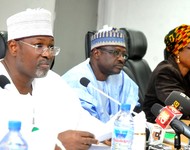Press Releases
The Positive Trend Of Free And Fair Elections In Nigeria

FOR IMMEDIATE RELEASE
AUGUST 18, 2014
ISSUED BY THE SOCIAL DEVELOPMENT INTEGRATED CENTRE (SOCIAL ACTION)
A PRESS STATEMENT ON:
The positive trend of free and fair elections in Nigeria.
Written by Lillian Akhigbe, Communications Officer.
The beauty of democracy is such that, the diverse and protean interests of the citizenry are freely expressed, but the wish of the majority holds sway, in the shaping of the collective public interest.
This truism has gradually been brought to bear in the elections conducted in Nigeria, under the watch of President Goodluck Jonathan. Steadily and progressively, our elections since 2011 have recorded substantial improvements and this positive trend has continued till date.
In contrast to the 2007 general elections which were marred with electoral violence and rigging, the 2011 general elections were described by most local and international observers as a significant improvement from the 2007 elections, with a relatively lower rate of electoral fraud. Between 2011 and this year 2014, the gubernatorial elections held so far in Edo, Kogi, Ondo, Anambra, Ekiti and Osun States for instance, have unarguably been more credible than the highly controversial 2007 general elections of which the winner of that presidential election, the late former President Umaru Yar’adua, publicly admitted that the electoral process was flawed.
The applaudable change in our elections, was unstintingly noted by an erstwhile President of the National Association of Nigerian Students (NANS) and member of Social Action, Mr Ken Henshaw, who succinctly stated that: “The Social Action, as a non-partisan civil society organisation, has been actively involved in election-monitoring in some states of Nigeria, and the truth remains that we are gradually beginning to experience a democracy where power ultimately comes from the people who are governed, through an election, rather than a selection, of their representatives. The recent governorship elections in Ekiti and Osun states, clearly attest to the developing trend of transparency in our electoral process”.
We highly commend the Prof. Attahiru Jega-led Independent National Electoral Commission, INEC, for this progressive transition in Nigeria’s elections, which is a far cry from what was obtainable during the period of Prof. Maurice Iwu’s leadership of the Commission, when many elections were after being conducted, either cancelled or their results overturned by Election Tribunals. We give kudos to INEC for entrenching the policy of ‘one man – one vote’ in our elections. We earnestly hope that this positive trend in the elections across Nigeria, would continue to get much better as the 2015 general elections draw closer. It is also expected that in the forthcoming elections, INEC would go the whole hog, by upgrading its system of operations to stop the disqualification of willing voters who have no permanent voter’s card (PVC). Our elections need to develop to an advanced stage where, with the aid of modern technology, Nigerians who have been duly registered to vote would be able to do so, even without a PVC or a temporary voter’s card (TVC).
We however must sound a note of caution to President Goodluck Jonathan on the massive deployment of heavily-armed military personnel during elections. We appreciate the crucial need to secure lives and property during and after elections, as well as the importance of ensuring that ballot boxes are not hijacked and votes are counted. But President Jonathan needs to consciously guard against a situation where elections become militarised, in the sense that, the fear of the gun overshadows the people’s desire to assert their democratic freedoms and the possibility of the military resorting to violence at some point, keeps prospective voters away from the polling units, thereby defining, in an undemocratic way, the outcome of the election.
For further enquiries, please contact Social Action






